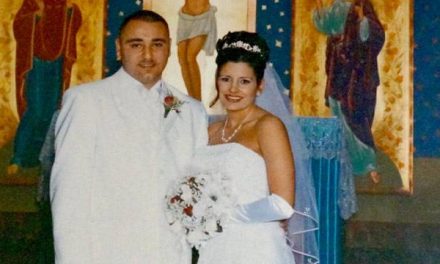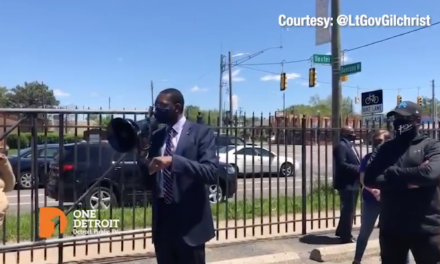Many eyes are on the results of today’s primary elections in Michigan, particularly when it comes to the gubernatorial race. The candidates have travelled all across the state giving stump speeches at campaign stops, spent hours going door to door, making phone calls to let voters and potential voters know their stances and what they would do if elected. Along the way, they’ve collected a fair share of memorable moments.
Six of the candidates for governor sat down with DPTV and its partners in the Detroit Journalism Cooperative for a series of interviews to get their take on taxes, education, government transparency, immigration, roads. At the end of the interview, we also asked them to reflect on what the campaign trail has been like, and what moments stuck out to them. Check out their answers below.
Gretchen Whitmer (D):
Hassan Khalifeh: Just going back to the race a little bit. Can you think of an interesting or touching moment you came across with a voter along the campaign trail?
Gretchen Whitmer: Yeah, so not long ago I was speaking with some kids at the Detroit Children’s Hospital. I was invited to come in and read. After we were done reading, I talked with them and their moms. One of the moms was trying to get her child to talk to me. She said tell her what you think is important. And here’s a child in a hospital gown and he said you know I want everyone to be able to read. And the 11-year-old chimed in and he said well I want everyone to have clean water. The enormity of sitting there with kids who are in the hospital, lobbying for literacy and water tells you how stressed out kids in Michigan are. I tell that story all the time because it really put a laser focus for me as a mom on the real issues we’ve got to solve quickly. Our education and the safety of our families in Michigan is paramount.
Shri Thanedar (D):
Shri Thanedar: I have met many voters, I’ve met teachers – teachers that have tears in their eyes when they describe to me how they get evaluated, how principals come to the classroom with a calculator and evaluate their performance, how they get humiliated with the test scores, how their salaries haven’t changed for the last ten years. And yet, I met these teachers in an Office Max and they’re buying supplies for their own school projects out of money from their pocket.
And I’ve met numerous seniors who are spending a big chunk of money on prescription medicine and people are paying hundreds of dollars. Especially, I met a woman who had – was diagnosed multiple times for cancer. And despite being on Medicare, she has several bills sent and she’s paying so much money on prescription medicine, that’s causing her not to be able to take care of her finances.
People are hurting. You know, even though our Governor talks about economic prosperity and job creation, a lot of people that I’ve met, all across – in Bay City, I met a young woman, she had a job in a manufacturing factory. Her name is Tammy. And she lost her job because the manufacturing company went all automation. And she now works at Taco Bell making $8.50, a single mom, she has two little girls. And that’s no life to live. And we need to give people skill sets so that they can be ready for tomorrow’s jobs as automation comes in, as robotics comes in, and jobs get outsourced.
Abdul El-Sayed (D):
Abdul El Sayed: There are many. Running for office is really privileged work. And the reason I say that is because I’m a physician by training and one of the most beautiful things about medicine is that it is so human. The idea of healing somebody. And people trust you with things they don’t tell anybody. Not even their closest loved ones they will tell you things. And running for office is similar because the reason as a doctor people tell you things is because they believe you can do something about it.
And I take that so seriously. And in running so many people have come to me and said, I want to tell you about this thing in my life. I won’t tell anybody about it. I remember being in Grand Rapids and we were at a — we had our debate and I was at the watch party after the debate. And this woman came up to me, she had bit tears in her eyes and she said, “I just want you to know why I’m here.” I said, why? She said, “I’m the mother of an eight year old boy who has beaten cancer twice and I don’t want to watch this kid become an adult and then realize that that kid is going to be bankrupt because the cancer comes back. And I’m here for Michicare and I’m here because I believe you are willing to stand up to those corporate guys, who we’ve had to fight so many times to get him the care he deserved. And I believe that you are willing to fight them for kids like him.” And you know, on my best days I try not to think about the gravity of that and the trust in that. But it gives you a lot to think about. And people are really struggling.
And so I am deeply thankful that they would trust me to share this information with me and to believe that me and the movement that we’re building have the ability to do something about it. But there’s not a day that goes by that I’m not touched by the lives that people lead. And sometimes really hard. And sometimes fun. You have kids come up to you — I had this young woman named Elise, who made me a it was an outline of an animal. And the animal was different parts. One was air and water and one was housing and this other and she said, “People just deserve to have these things.” I couldn’t connect why it was in the outline of an animal, but I appreciated that it was. And it’s now up on the office in our up on the wall in the office.
You know, you touch all kinds of people. And they touch you. And you know, I just deeply appreciate that.
Jim Hines (R):
Jim Hines: The day when my fourth son, Titus, came to me and said, “Dad, can you watch the two grandchildren because my wife and I are going to go to Florida in search for a full-time job?” And I cried. They left, and within a week found a full-time job, came back. They were back for about three days, packed up their stuff in a U-Haul and left Michigan. That was with me.
Patrick Colbeck (R):
Patrick Colbeck: There’s tons of sensitive moments. There’s a lot of anecdotes that I’ve gotten from a lot of my folks, too, out on the road. We had a gentleman just recently out in Stillman, Michigan, which is up in the UP, had a Colbeck bumper sticker. And this guy gets out of his car, runs up to him and says that’s my guy. That’s the guy I’m voting for. And he goes really? He goes yeah, not only am I voting for him, my whole GMUAW Local is voting for him. He goes really? And he goes yeah, they told us to vote for Hillary in the last election. We all voted for Donald Trump. This time they’re telling us to vote for Gretchen Whitmer. We’re all voting for Colbeck. And it’s stories like that that happen all over the state that warm my heart. There’s a lot of stuff not getting reported that’s happening on the ground that is really appreciated.
Now, I can recall back in my state senate run when I was knocking on doors and talking to somebody who just looked sad. And I sat down next to him. He was on a rocking chair. And he wasn’t on my list to go off and walk, but I saw the gentleman sitting out there and went up to him. Turned out that his wife of something like 50 years had recently passed away, and he was out there sifting through this poetry that he had written for her while he was there. So you’re never supposed to spend more than two minutes at any door. I ended up spending about 45 minutes sitting down as he’d recite all that poetry to me, and you can tell…I don’t even know if I got the guy’s vote at the end of this. But you could tell it made a huge difference for him when I left.
And there’s so many people that are out there hurting just like that gentleman that are looking for somebody just to give them a voice. This election’s about that. It’s about giving people a voice. I never wanted to go into politics. It’s still my least favorite occupation I’ve ever had in my life. But there’s so many people that do not feel like they’re getting their voice out there, that I do my best to make sure that we can get that voice out. Right now I’m the only Republican state senator in Wayne County, and a lot of people in Wayne County feel like their voice is lost. They’ve adopted me as their state senator to go off and look into matters that their representatives are not doing. We’ve been the land of misfit toys where people will come to us because we will listen to them when nobody else will.
And those are the stories that touch my heart. I cannot stand bullies, and when the government’s acting like a bully, I make sure they’re held accountable. When there’s just people that are not in the government act as bullies, I make sure they’re held accountable, too. There’s tons of stories we could go on and on. Actually, I share a lot of these stories in my book, Wrestling Gators: An Outsider’s Guide to Draining the Swamp. If you go through that, it’s got a lot of personal stories that get into some detail and some things that actually happened. And it also talks about how government really works on the inside, which I think people would find pretty enlightening.
Brian Calley (R):
Brian Calley: Yeah, actually there was a lady who tapped on my shoulder. I was sitting right in front of her. She asked kind of shyly. She said excuse me, are you the Lieutenant Governor? I said yeah. You never know how that is going to go. I said yeah. She said I have a son with autism. We were lost. We could not get any help for him. Everything changed. He has ABA therapy and he is doing so great now. He went from not speaking to speaking. I just know that that was only possible from the work that you did. I could live off an interaction like that for a month. I had put up with $1 million in negative ads against me. An interaction like that makes it all worth it.
More on the Detroit Journalism Cooperative Gubernatorial Candidate Interviews:
This year, Michigan voters will be selecting a new governor, who will be facing important issues that will determine the health and vitality of the state for years to come.
The first step in the electoral process is the state primary on August 7, when the standard bearer for both the Democratic and Republican parties will be determined.
The Detroit Journalism Cooperative invited all major party candidates to the Detroit Public Television studio for individual, hour-long interviews with a panel of its reporters. The candidates received virtually the same questions and were able to respond at length, providing voters with a much more in-depth and contextual understanding of where each stood on the issues of importance to the state than they can glean from conventional coverage.
So please consider their opinions carefully and, most of all, vote!
Every candidate accepted the invitation to be interviewed except for Attorney General Bill Schuette.









